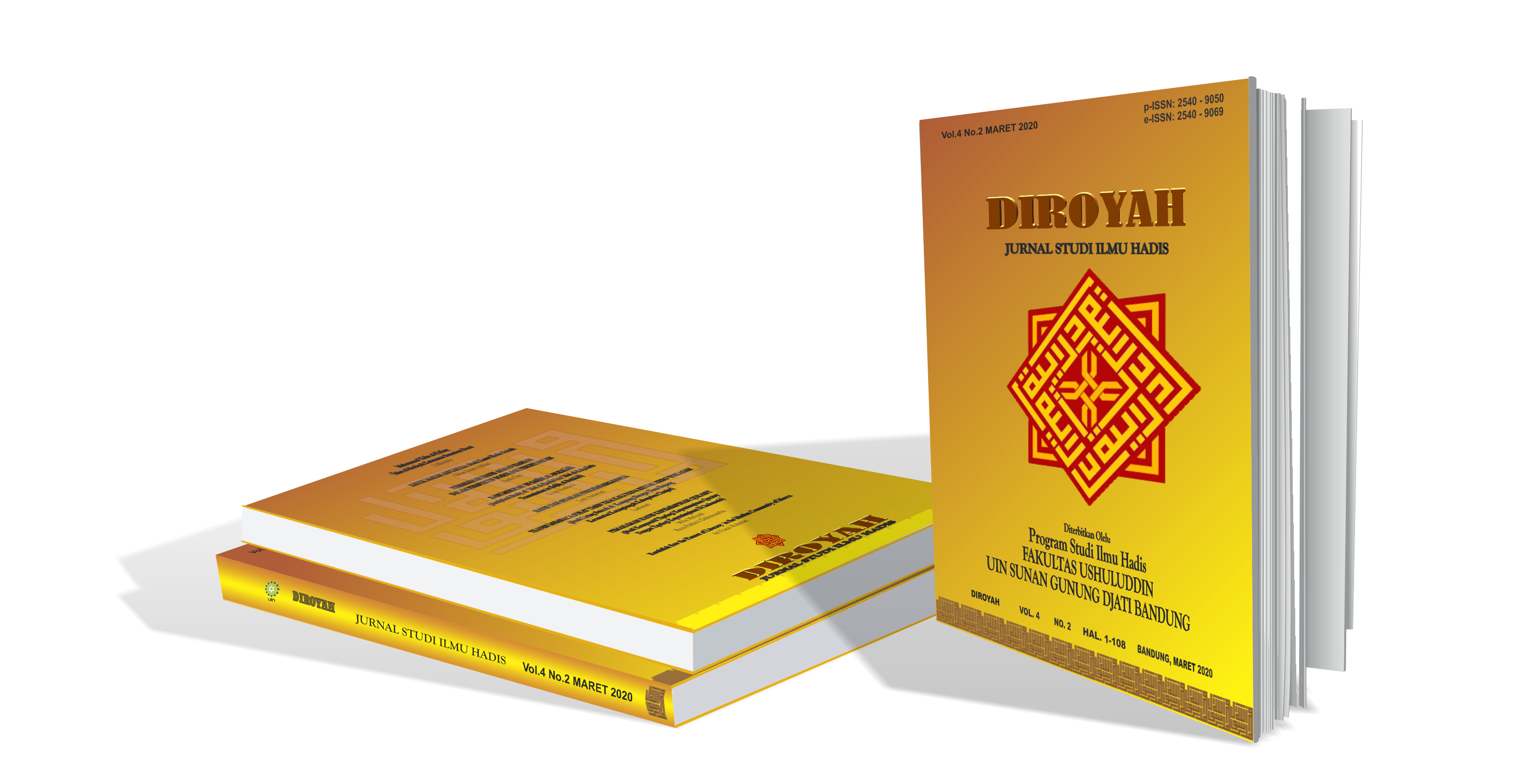MM Azami’s Contribution to Countering Hadith Skepticism and Its Influence in Indonesia
Main Article Content
Abstract
Western scholars’ objections to the authenticity of hadiths began from the 19th century until the 20th century. They argued with various skeptical narratives that the hadith of the Prophet Muhammad never existed. In the dynamics of hadith studies, the ideas of Western scholars have become a new paradigm that has sparked serious responses from Muslim scholars including Mustafa Azami. This article aims to analyze Azami’s role in fighting Western Scholars’ Hadith skepticism, as well as Azami’s influence in Indonesia as a pioneer of this study. This article uses a qualitative method involving literature review, and then analyzes it using Thomas Khuns’ paradigm shift theory. This article concludes that Azami has proven the Hadith Skepticism thesis put forward by Western scholars, which is not sustainable because there is inequality in the realm of hadith science. Likewise, Western scholars’ ideas about the authenticity of hadith have also not been developed. Meanwhile, Azami's academic work has had a huge impact on hadith studies in Indonesia.
Article Details
Authors who publish with this journal agree to the following terms:
- Authors retain copyright and grant the journal right of first publication with the work simultaneously licensed under a Creative Commons Attribution-NonCommercial-ShareAlike 4.0 International License that allows others to share the work with an acknowledgment of the work's authorship and initial publication in this journal.
- Authors are able to enter into separate, additional contractual arrangements for the non-exclusive distribution of the journal's published version of the work (e.g., post it to an institutional repository or publish it in a book), with an acknowledgment of its initial publication in this journal.
- Authors are permitted and encouraged to post their work online (e.g., in institutional repositories or on their website) prior to and during the submission process, as it can lead to productive exchanges, as well as earlier and greater citation of published work (See The Effect of Open Access).
References
‘Aid bin ‘Abdullah al-Qarni. (2005). al-Bid’ah wa Atsaruha fi al-Dirayah wa al-Riwayah. Dar Ibnu Hazm.
A. Kevin Reinhart. (2010). Juynbolliana, Gradualism, the Big Bang, and Hadith Study in the Twenty-First Century. Journal of the American Oriental Society, 130(3), 413–444.
Abd Qahin dan Siti Kasiyati. (2020). Critism of Orientalist Views Toward Hadith Studies. Journal of Hadith Studies, 3(1).
Ali Mustafa Yaqub. (2000). Kritik Hadis. Pustaka Firdaus.
Ali Mustafa Yaqub. (2006a). Haji Pengabdi Setan. Pustaka Firdaus.
Ali Mustafa Yaqub. (2006b). Islam Masa Kini. Pustaka Firdaus.
Ali Mustafa Yaqub. (2008). Fatwa-fatwa Imam Besar Masjid Istiqlal. Pustaka Firdaus.
Andi Rahman. (2022). Uji Autensitas Hadis dan Telaah Otoritasnya terhadap Syariat Islam. Maktabah Darus Sunnah.
As’ad Said Ali. (2012). Ideologi Gerakan Pasca-Reformasi. LP3ES.
Halit Ozkan. (2004). The Common Link and It’s Relation to the Madar. Islamic Law and Society, 11(1).
Harald Motzki. (2010). Analysing Muslim Tradition; Studies In Legal, Exegetical, and Maghazi Hadith. Bril.
Herbert Berg. (2000). The Development of Exegesis in Early Islam: The Authenticity of Muslim Literature from the Formative Period. Richmond Surrey.
Ibn Warraq. (1995). Why I am Not a Muslim. Promotheous Books.
Ibnu Ishaq. (1990). al-Sirah al-Nabawiyyah. Dar al-Kitab al-’Araby.
Idri Shaffat dan Rohaizan Baru. (2019). Orientalits Perspectives on the Hadith. International Journal of Academic Research in Business and Social Sciences, 9(11), 1326–1339.
Ignaz Goldziher. (1971). Muslim Studies.
John W. Creswell dan J David Creswell. (2018). Research Design: Qualitatuve, Quantitative, and Mixed Methods Aproaches. Sages.
Joseph Schacht. (1964). An Intoduction to Islamic Law. Clarendom Press.
Julian Baldick. (2002). Islam Mistik Mengantar Anda ke Dunia Tasawuf. PT. Serambi Ilmu.
Mir Ahmad Sheraz dan Sadiq Wasim. (2021). Orientalist Approach to Hadith Literature and Muslim Critique: A Study of Muhammad Mustafa Azami. International Journal of Creative Research Thoughts, 9(1), 2367–2374.
Mohammad Mostafa Azami. (1978). Studies in Early Hadits Literature. Al-Maktab Al-Islami.
Mohammad Mustafa Azami. (2002). Studies in Hadith Methodology and Literature. Islamic Books Trust.
Muhammad Alfatih Suryadilaga. (2011). Kajian atas Pemikiran John Wansbrough tentang Al-Qur’an dan Nabi Muhammad. Tsaqafah, 1(7).
Muhammad Asri Nasir dan Muhammad Ramzy Nasiruddin. (2021). Klasifikasi Model Pemikiran Orientalis Hadis dalam Perspektif Herbert Berg. Aqlam: Journal of Islam and Plurality, 6(2), 123–134.
Muhammad bin Yahya al-Andalusi. (1405). al-Tamhid wa al-Bayan fi Maqtal al-Shahid ‘Uthman. al-Tsaqafah.
Muhammad Mustafa Azami. (1982). Manhaj Naqd Inda al-Muhadditsin. Syirkah al-Thiba’ah al-Saudiyyah al-Mahdudah.
Mustafa al-Sibai. (1982). al-Sunnah wa Makanatuha fi al-Tashri‘ al-Islami. Al-Maktab Al-Islami.
Rooby Pangestu Hari Mulyo. (2022). Metode Penerjemahan Al-Qur‟an Dan Kritik Muhammad Thalib Terhadap Q.S An-Nisaa: 34 Versi Departemen Agama. Khuluqiyya: Jurnal Kajian Hukum Dan Studi Islam, 4(2), 182–201. https://doi.org/10.56593/khuluqiyya.v4i2.87
Sanuri. (2009). Muslims’ Responses towards Orientalists’ views on Hadis as the Second Source of Law in Islam with special Reference to Mustafa al-Siba’i’s Criticism Toward Ignaz Goldziher’s Viewpoints. Al-Qanun, 12(2).
Thomas Kuhn. (1970). The Structure of Scientific Revolutions. Univeristy of Chicago Press.
Wael B Hallaq. (1999). the Authencity of Prophetic Hadith: A Pseudo-Problem. Studia Islamica, 89, 75–90.

